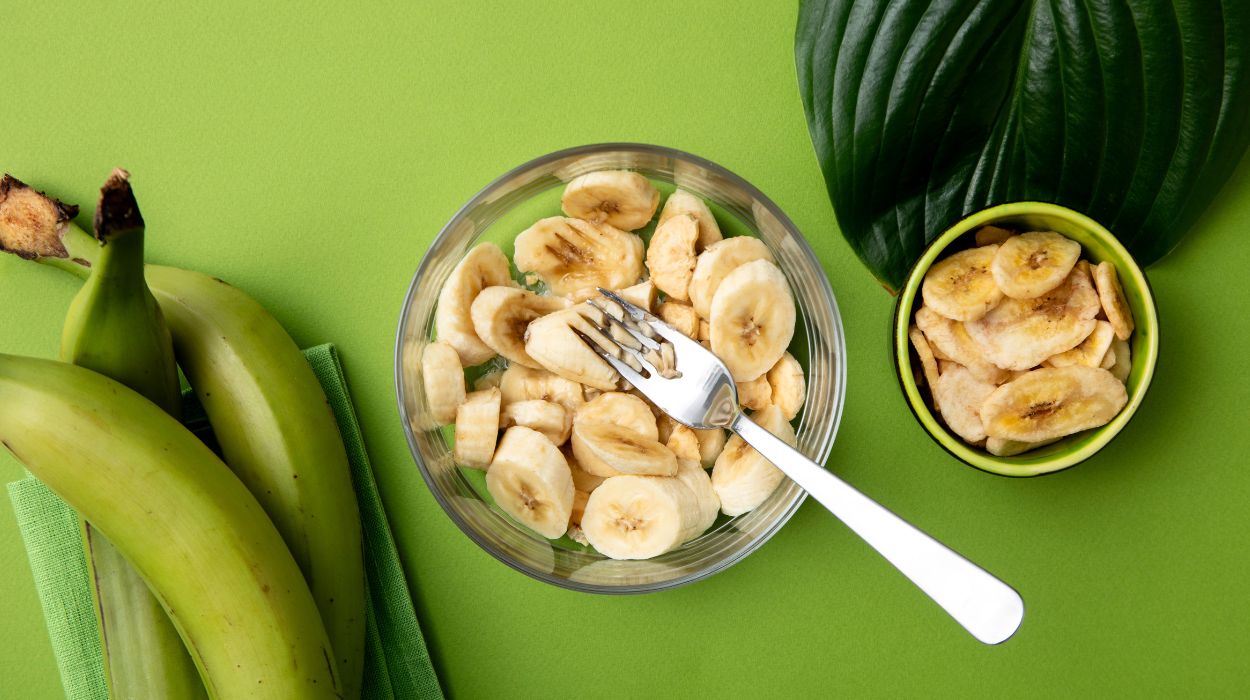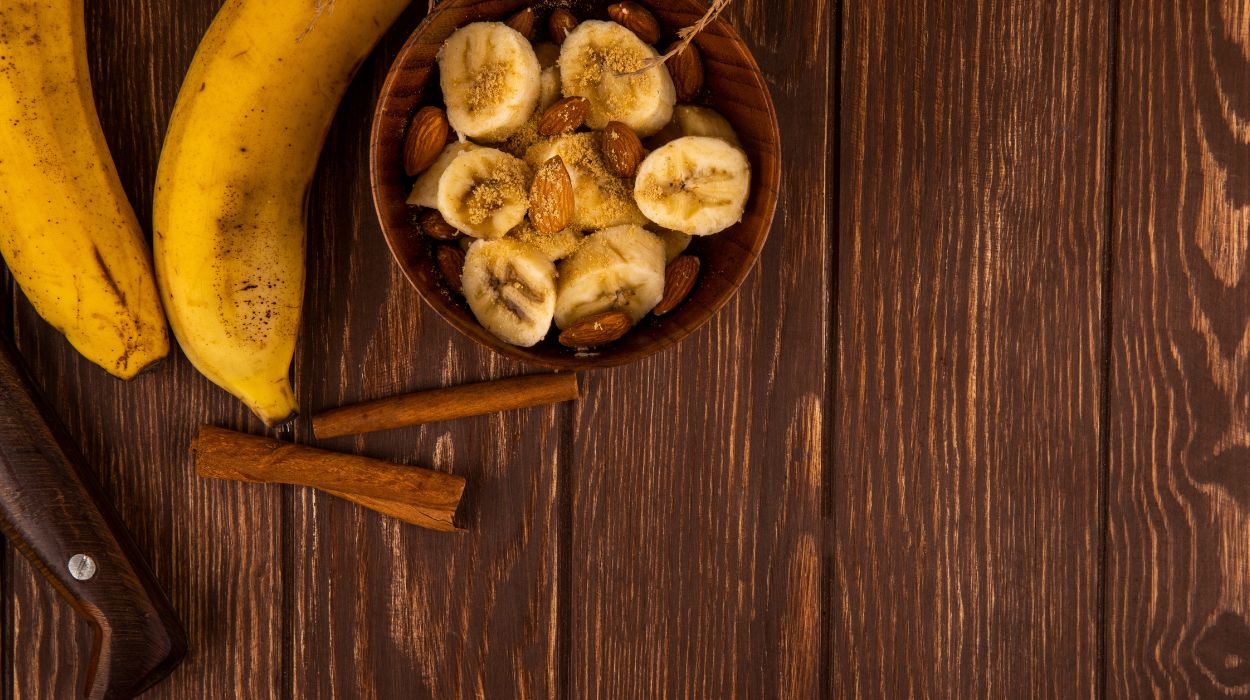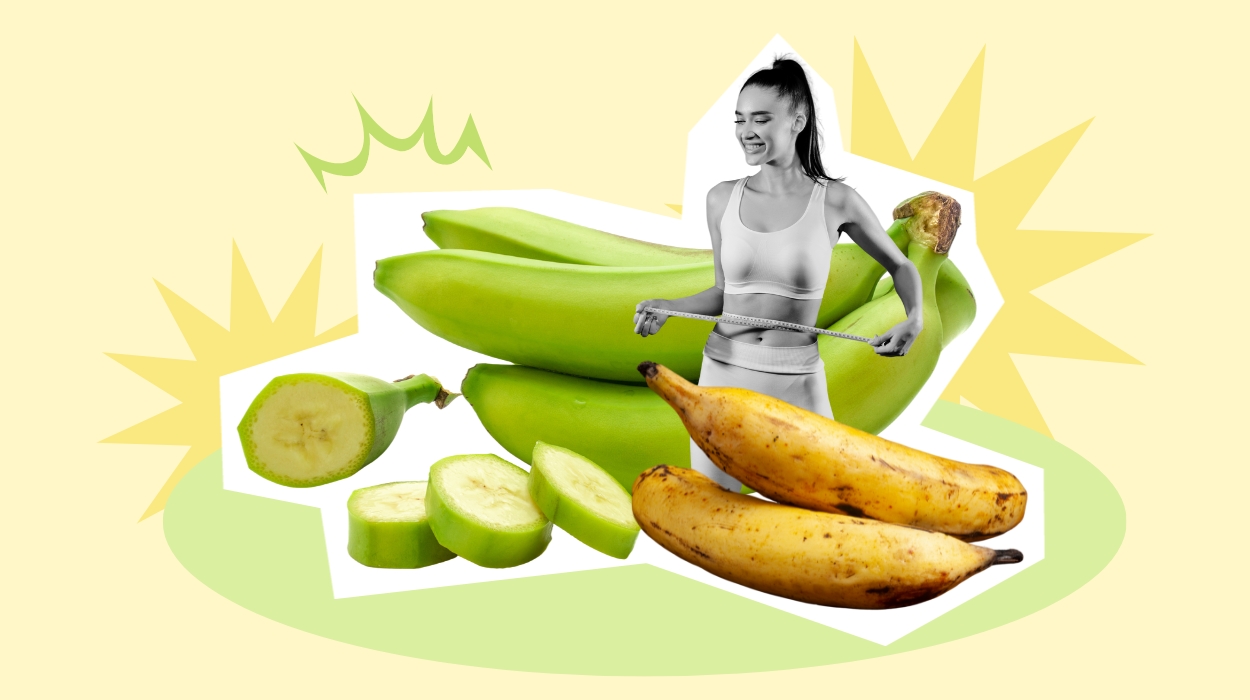When starting a weight loss journey, choosing the best food options that support your goals is paramount. One food that has entered weight loss discussions is plantain, a starchy tropical fruit with rich cultural history and culinary versatility.
In this article, we will delve into the question: Is plantain good for weight loss? Examining plantains’ nutritional composition, we will look at the potential ways they can help you shed fat.
We will also explore plantains’ other health benefits and how you can prepare them. We will give you specific tips on how to eat plantain for weight loss. We will also review how to balance their consumption with a diet of lean proteins, vegetables, and healthy fats.
So, if you’re ready to learn more, let’s begin!
Can Eating Plantains Help You Lose Weight?
Yes, plantains can be beneficial for weight loss. Despite their higher carbohydrate content, plantains offer substantial dietary fiber. Fiber promotes a sense of fullness, which can support weight loss efforts. Plantain also contains resistant starch, which further imparts satiety. However, mindful preparation is crucial, as cooking methods and accompanying ingredients can impact calorie content. Integrating plantains into a balanced diet will allow you to harness their nutritional benefits while aligning with your weight loss goals.
Is Plantain Good For Weight Loss?

Plantains can be a valuable addition to a weight loss diet for several reasons.
While they are relatively high in carbohydrates, plantains also contain a substantial portion of dietary fiber. One average-sized plantain,[1] about 270 grams, contains about five grams of dietary fiber. Fiber contributes to a sense of fullness and has been shown to support weight loss[2] efforts.
Sufficient fiber intake also helps regulate[3] blood sugar levels, which also supports weight management.
Plantains also contain a type of starch[4] that behaves like fiber in the digestive system. Resistant starch can increase feelings of satiety[5] and potentially support weight loss efforts.
However, it’s crucial to consider how plantains are prepared and consumed. While they offer nutritional benefits, cooking methods, and accompanying ingredients can significantly increase calorie content and contribute to weight gain.
Choose healthier cooking methods, such as baking or grilling instead of frying. Also, try to incorporate plantains into well-balanced meals to maximize their benefits for weight loss.
What Are Plantains?
Plantains are a starchy tropical fruit that is part of the banana family but is larger in size and has thicker skin. They transform color from green plantains when unripe to yellow plantains and darken as they ripen.
Found as an extremely important staple[6] in African, Caribbean, and Latino cuisines, plantains play a role more akin to potatoes than fruits in these regions. Increasingly available in the U.S. and Europe, plantains are gaining popularity as people discover diverse ways of preparing and enjoying this starchy fruit.
While bananas are eaten raw in the U.S. and Europe, plantains are larger, firmer, and have a less sweet taste. Plantains carry a subtle banana flavor but are much starchier. Unlike dessert bananas, plantains are typically cooked before serving as they don’t taste good raw
Green plantains, comparable to potatoes in firmness, boast a higher starch content. Yellow plantains are softer, sweeter, and less starchy. Very ripe plantains have a deep yellow flesh and an even sweeter flavor.
Health Benefits Of Plantains

Plantains offer a range of health benefits, making them a nutritious addition to your diet. Here are some of the top health benefits associated with eating plantains.
Rich In Nutrients
Plantains are a great source[1] of essential vitamins, including vitamin A, vitamin C, and vitamin B6. They also contain important minerals, including magnesium and potassium.
Cardiovascular Health
Certain compounds found in plantain have been studied for their potential cardiovascular benefits.
Plantains are a great source of potassium, a mineral crucial in supporting a healthy cardiovascular system.[7] Numerous studies have shown a higher dietary potassium intake is associated with lower blood pressure levels.[8] Lower blood pressure, in turn, is linked to a reduced risk[9] of cardiovascular diseases.
The fiber content in plantains may also contribute to heart health. One study found a link between higher dietary fiber intake and a reduced risk[10] of cardiovascular disease.
Plantains contain antioxidants, including vitamin C and flavonoids, which may support cardiovascular health.[11] Antioxidants can help combat oxidative stress and inflammation, which are linked[12] to cardiovascular disease development.
Digestive Health
Plantains contribute to digestive health through their rich nutritional profile, particularly in terms of dietary fiber and resistant starch. These components of plantains are slowly digested.
Plantains are a rich source of insoluble fiber, which is crucial in regulating regular bowel movements and preventing constipation. This fiber supports bulky stools, helping them to move more easily through the digestive tract. This aids digestion.
Plantains contain resistant starch, which resists digestion in the small intestine and reaches the colon intact. In the colon, resistant starch acts as a prebiotic,[13] promoting the growth of beneficial bacteria. These friendly bacteria, known as probiotics, are vital in maintaining a balanced and healthy gut microbiota.
Rich in antioxidants, plantains exhibit anti-inflammatory properties. Chronic inflammation in the digestive tract is associated with various digestive disorders.[14] Antioxidants help fight free radicals and inflammation, potentially contributing to a healthier digestive system.
Immune Health
Plantains can support immune health due to their rich nutritional content, including essential vitamins, minerals, and antioxidants.
Plantains are rich in certain vitamins, such as vitamin C, an antioxidant known for its immune-boosting[15] properties. Vitamin C plays an important role in the generation of white blood cells, which are important immune system components. These cells help defend the body against infections and illnesses.
Plantains are also rich in vitamin A, another important nutrient for immune function.[16] Vitamin A supports the skin’s and mucous membranes’ integrity, acting as a barrier against pathogens. It also plays a role in the development and activation of immune cells.
The antioxidants found in plantains help neutralize free radicals in the body, reducing oxidative stress. Oxidative stress is an imbalance between the production of free radicals and the body’s ability to neutralize them, potentially causing cell damage. By mitigating oxidative stress, antioxidants support overall immune function[17] and may help prevent chronic diseases.[18]
As mentioned previously, the fiber in plantains contributes to better gut health. A healthy gut is closely linked[19] to a stronger immune system, as the gut microbiota can influence immune responses.
How To Incorporate Plantains Into Your Diet
Plantains are a year-round staple available at most major local grocery stores. Their three main stages of ripeness determine their versatility in preparation:
- Green Plantains: At the green stage, unripe plantains have a firm pulp, often requiring a knife for peeling. Not fully ripe, they are starchy and lack sweetness, resembling the texture of a potato.
- Yellow Plantains: Less starchy and slightly sweeter than their green counterparts, they are ripe and mature. Best suited for frying, cooking, or grilling, these plantains offer a balanced flavor profile.
- Black Plantains: Despite their color, black plantains remain edible and are the sweetest and softest at this stage.
If you don’t plan to prepare your plantains immediately, opt for a less mature fruit and let it ripen at home. However, once ripe, plantains have a limited shelf life and should be consumed before they spoil.
How To Prepare Plantains
The initial steps in preparation include washing the plantain, trimming both ends with a knife and carefully peeling by slicing lengthwise along the ridges. The peeled plantain can be diced, chopped, or cooked whole, depending on how they are being consumed.
Here are some popular ideas to get you started:
- Dice or chop and add to stews and soups.
- Slice green plantains thinly and fry or bake for a crunchy and savory snack.
- Use as a potato substitute in curries.
- Mash ripe plantains and use them as a side dish or a base for other recipes.
Choosing The Best Plantains For Weight Loss
When looking at specifically incorporating plantains into your diet for weight loss, there are several things you can do:
- Choose the right ripeness: Opt for green or yellow plantains over black ones. Green plantains are lower in sugar and starch,[20] making them a better choice for weight loss.
- Healthy cooking methods: Avoid frying plantains, which can significantly increase their calorie content. Instead, choose healthier cooking methods like baking, grilling, or boiling.
- Portion control: Be mindful of portion sizes. Even though plantains offer nutritional benefits, consuming large portions can contribute to excessive calorie intake.
- Incorporate into a healthy diet: Use plantains in well-balanced meals that include lean proteins, vegetables, and healthy fats.
If you’re struggling to meet your fruit and vegetable intake, fruit and vegetable supplements and greens powders are available on the market. However, it’s important to speak to a healthcare professional before trying any new supplements.
Conclusion
Plantains stand out as a nutritional powerhouse with a variety of benefits that support health and weight loss.
As plantains continue to gain popularity in the U.S. and Europe, it’s crucial to appreciate their nutritional benefits and the importance of their mindful preparation. By choosing healthier cooking methods and incorporating plantains into a healthy diet, you can maximize their benefits for your health.
Whether enjoyed as crispy plantain chips, incorporated into savory stews, or used as a potato substitute, plantains offer many versatile options.
Frequently Asked Questions
No, plantains are not low in carbs. They are a starchy fruit with a moderate to high carbohydrate content, depending on their ripeness. If you’re following a low-carb diet, you should consume plantains in moderation.
Yes, plantains are a healthy carbohydrate source. They provide essential nutrients, including fiber and resistant starch, potentially supporting weight loss.
Boiled plantains can be a good option for weight loss. They retain their nutritional benefits, while being prepared without added oils or fats, making them a healthy choice for a weight-loss diet.
Fried plantains can be enjoyed in moderation as part of a weight loss diet. However, mindful portion control and healthier cooking methods can help manage calorie intake while enjoying this fruit.
 Expert's opinion
Expert's opinion